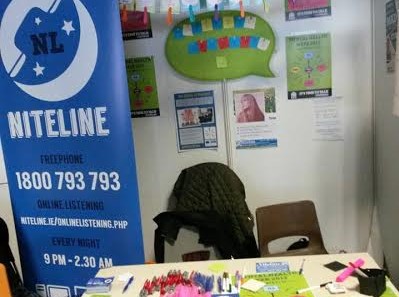Sinéad Baker | Deputy Online Editor
Niteline, a phone and online listening service ran by students for students in TCD, UCD, DCU, RCSI, NCAD and Maynooth, is trialling a new ‘public faces’ campaign which aims to both increase both their publicity and connect more students with the service.
I sat down with Hannah Jean Ryan, Niteline’s coordinator, to discuss the changes taking place in the organisation. Niteline runs a strict policy of anonymity; their posters claim, “We won’t know who you are”, and their volunteers are trained to keep their involvement with the organisation secret. Hannah emphasised that although it seems they face a dilemma by launching this new campaign, as “anonymity is so fundamental to who we are”, she stressed that their policy of confidentiality and anonymity will never be compromised. “Anonymity has been one of our four cornerstones since the beginning. It’s important for students to be really confident that we take this policy seriously, especially as a student organisation. Those policies have to be respected.”
As a result of their training many volunteers would not have felt comfortable being a public face without coming off the phones
The new campaign will see Hannah and the current Regional Representative (formerly a trainer and Coordinator) Aaron Watson become the current ‘faces’ of Niteline; their experiences of working with and their knowledge of the organisation were cited as the reasons they were chosen to act as its spokespeople. “I’m no longer in college anymore, and I’m no longer on the phones, so for me it makes sense”, clarified Hannah, highlighting how as a result of their training many volunteers would not have felt comfortable being a public face without coming off the phones, “and that’s the heart of our service”. The new campaign follows the success of Nitelines in the UK with similar campaigns. “It means we can put a voice on the organisation, and speak at public events and to the media” she explained, citing previous frustrations at having to use volunteers from the Students’ Union or peer mentors rather than their own volunteers. “We’ve had our people out in morph suits before, to remind people that we’re here, but some people did find it creepy. We believe really strongly about what we do and we want to be able to talk about it.”
Niteline is currently unable to release many figures regarding callers, and often have to rely on feedback from Welfare Officers. “We’ve tried to stay creative, but we can’t go much further without this step,” Hannah explained, “it’s hard to publicise with such strict anonymity. It’s an enormous challenge to humanise the service and to connect with students. We want to improve transparency so people can engage with us”. The step would also allow them to speak publicly about welfare from a student perspective, an area they believe they are uniquely qualified to speak about, “We’re open 9pm until 2.30am, when the services offered by the Welfare Officer and Counselling Service are closed.”
Anonymity will always remain at the heart of the service
I asked Hannah about the future for Niteline if this trial campaign is successful, and she stressed that anonymity will always remain at the heart of the service. “In some Nitelines all of Exec are public, but it just couldn’t work that way here. The College community is not that big, even if a student tells their housemate they work for Niteline it might make them reluctant to call. We have to be mindful of the different cultures”. The success of their instant messaging service, which has “taken off enormously”, has been partly attributed to the extra level of anonymity that it provides; no one can recognise your voice, and you cannot be overheard. The organisation is committed to continuing to value this commitment to anonymity and confidentiality; she admits “it might be hard to create a presence with only two people, but the ‘public faces’ campaign will never extend to all of our volunteers”. She clarified that it may one day expand to a core group of five or ten volunteers yet maintained, “we have a long way to go before that.”
The organisation is currently working on releasing a statistics package of those statistics which they can release legally, “we’re receiving more calls than ever, and we need more facilities” Hannah added.
“For us volunteer support is number one, they give up their sleep and we have to make sure they’re safe”
Niteline trains their volunteers through a group of four trainers that are elected by Exec, “They are experienced volunteers, and training is on-going”. The system is based off the success of many Nitelines in the UK, and Hannah is keen to emphasise the support network in place for volunteers, “we have a mandatory support meeting every two weeks for all volunteers, we’re very strict and they can only talk about their emotions but there’s a massive support culture. For us volunteer support is number one, they give up their sleep and we have to make sure they’re safe.”
Niteline commits itself to the principles of “non-directive listening”, listening “carefully and with attention” without offering professional advice unless asked for information. The service provides an unbiased and impartial space for students to “explore their problems” and to receive support and information from a unique student perspective. They urge any students with issues to get in touch with the service, and for anyone with questions to contact [email protected]







